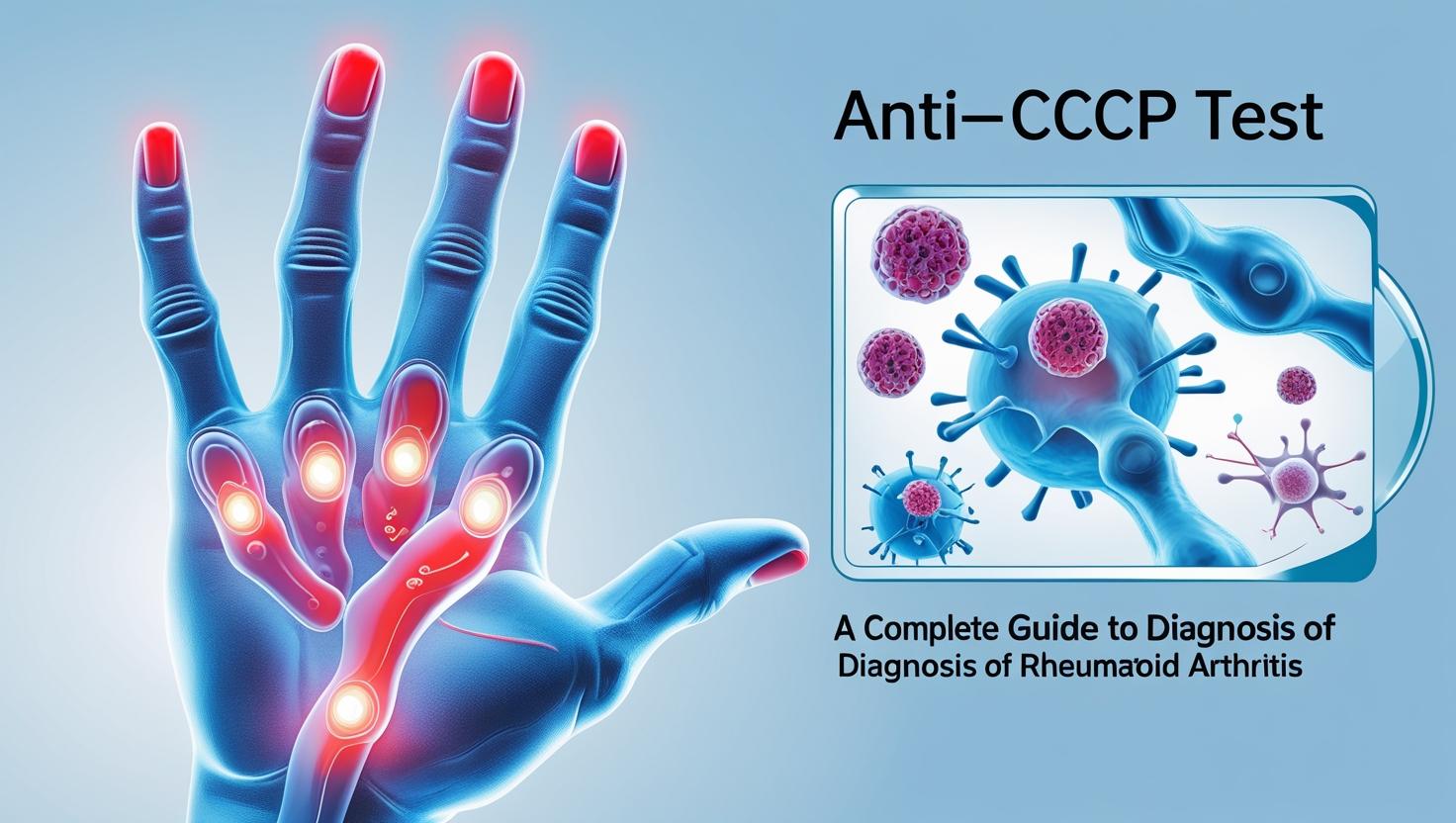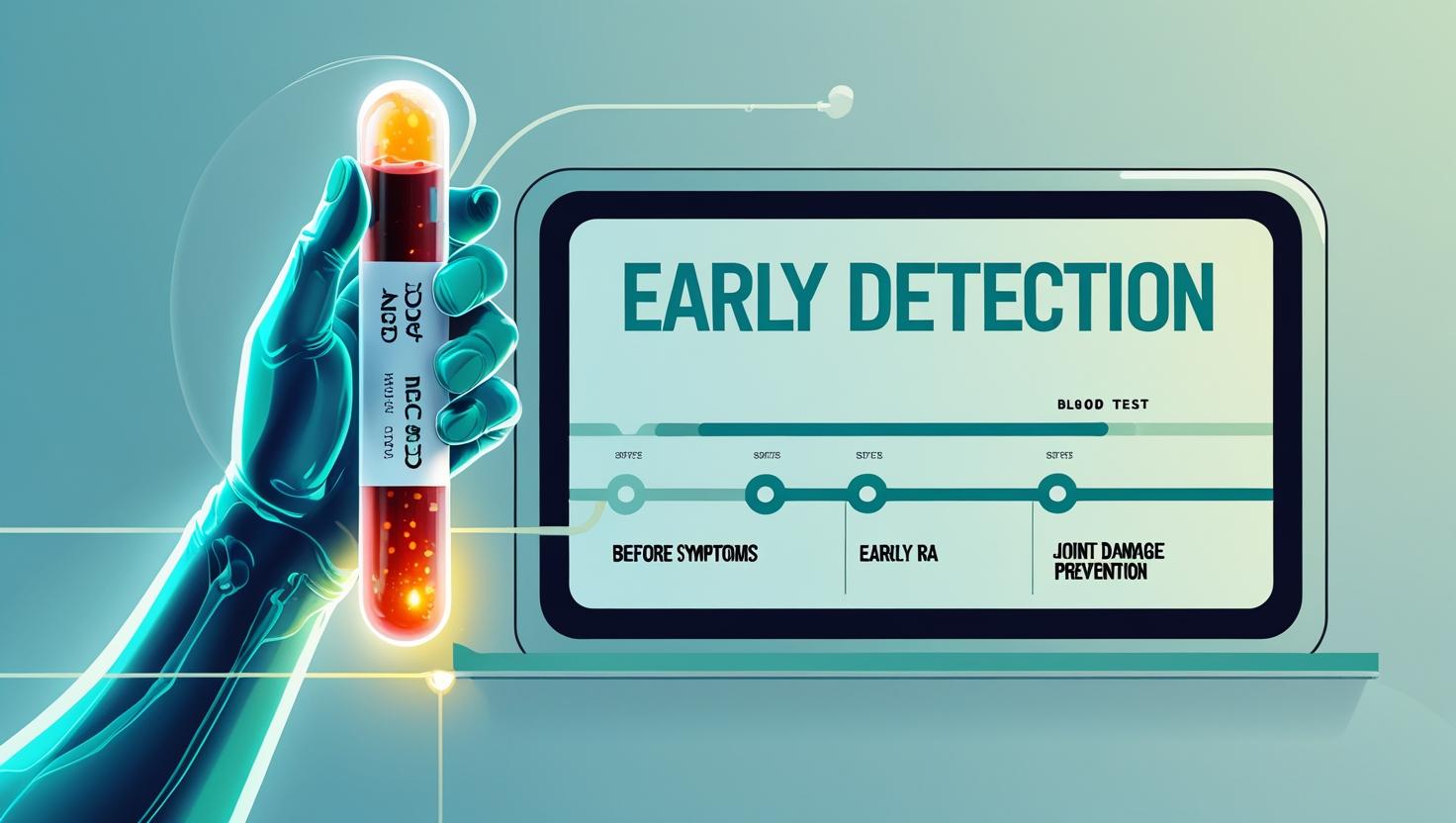The Anti-Cyclic Citrullinated Peptide (Anti-CCP) test is an essential tool in diagnosing and managing rheumatoid arthritis (RA). It has revolutionized the early detection of RA and helps distinguish it from other autoimmune conditions. In this blog, we will explore everything you need to know about the Anti-CCP test, including its purpose, procedure, interpretation, clinical significance, and common FAQs.

What is Anti-CCP?
Anti-CCP antibodies are autoantibodies directed against cyclic citrullinated peptides, which are proteins modified by a process called citrullination. This modification occurs naturally in the body but, in autoimmune conditions like RA, the immune system mistakenly identifies these modified proteins as foreign and produces antibodies against them.
Key Points:
- Autoantibodies are proteins produced by the immune system against the body’s own tissues.
- Anti-CCP antibodies are highly specific to rheumatoid arthritis.
- Their presence can precede the clinical symptoms of RA by several years, making them valuable in early dia
Why is the Anti-CCP Test Done?
The Anti-CCP test is primarily ordered to:
- Diagnose Rheumatoid Arthritis Early
Early detection of RA is crucial to prevent joint damage and deformities. Anti-CCP antibodies often appear before the onset of symptoms, making this test a predictive marker. - Differentiate RA from Other Forms of Arthritis
Joint pain and inflammation can result from various conditions, including osteoarthritis, lupus, and psoriatic arthritis. Anti-CCP antibodies are highly specific to RA, helping clinicians distinguish it from other autoimmune or inflammatory joint diseases. - Predict Disease Severity
Higher levels of Anti-CCP antibodies are often associated with more aggressive RA and faster progression of joint damage. This information helps doctors tailor treatment plans. - Monitor Response to Therapy
While Anti-CCP antibodies are not typically used for ongoing monitoring, baseline levels can sometimes provide context for treatment efficacy and disease activity.

How is the Anti-CCP Test Performed?
The Anti-CCP test is a blood test performed in a laboratory. Here’s what you can expect:
1. Sample Collection
- A blood sample is drawn from a vein, usually in the arm.
- No special preparation is needed, although fasting is not required.
2. Laboratory Analysis
- The blood sample is sent to the laboratory.
- Anti-CCP antibodies are detected using enzyme-linked immunosorbent assay (ELISA) or other immunoassay methods.
- Results are expressed as units per milliliter (U/mL) or as positive/negative based on a laboratory-specific cutoff.
3. Reporting
- Laboratories may report results as negative, borderline, or positive.
- The cutoff values vary depending on the assay used, but generally:
- Negative: <20 U/mL
- Borderline: 20–39 U/mL
- Positive: ≥40 U/mL
Always refer to the laboratory’s reference range for accurate interpretation.
Understanding Anti-CCP Test Results
1. Positive Result
- A positive Anti-CCP test strongly suggests the presence of rheumatoid arthritis, even if symptoms are mild or absent.
- High specificity (~95–98%) means false positives are rare.
- Positive Anti-CCP can appear years before clinical symptoms, indicating preclinical RA.
2. Negative Result
- A negative Anti-CCP test does not completely rule out RA.
- Some patients, especially those with seronegative RA, may have negative Anti-CCP but still develop the disease.
- Other markers, such as Rheumatoid Factor (RF), may complement diagnosis.
3. Borderline Result
- A borderline or equivocal result may require repeat testing after a few weeks or months.
- Clinical correlation with symptoms and imaging studies is essential.

Clinical Significance of Anti-CCP
The Anti-CCP test is not just a diagnostic tool; it has significant implications for disease management:
1. Early Detection
- Anti-CCP antibodies may appear 5–10 years before RA symptoms, allowing early intervention.
- Early treatment with disease-modifying drugs (DMARDs) can prevent irreversible joint damage.
2. Predicting Disease Severity
- Patients with high Anti-CCP levels are more likely to develop erosive joint disease.
- Doctors may choose more aggressive therapy for these patients.
3. Differentiating RA from Other Autoimmune Diseases
- Anti-CCP antibodies are rare in other autoimmune diseases such as lupus or osteoarthritis.
- This specificity helps reduce misdiagnosis.
4. Prognostic Value
- Persistent positivity for Anti-CCP antibodies often correlates with poorer long-term outcomes in RA.
- Monitoring these levels can assist in evaluating risk of disease progression.
Anti-CCP vs Rheumatoid Factor (RF)
Both Anti-CCP and Rheumatoid Factor (RF) are used in diagnosing RA, but there are important differences:
| Feature | Anti-CCP | Rheumatoid Factor (RF) |
| Specificity | Very high (~95–98%) | Lower (~70–80%) |
| Sensitivity | Moderate (~70–80%) | Moderate (~70–80%) |
| Early Detection | Appears early, sometimes years before symptoms | Appears with symptoms |
| Prognostic Value | High (predicts erosive RA) | Moderate |
| Present in Other Diseases | Rare | More common in other autoimmune or infectious diseases |
Key takeaway: Anti-CCP is more specific than RF for RA, making it invaluable in early and accurate diagnosis.
Factors Affecting Anti-CCP Test
Several factors can influence the Anti-CCP test:
- Disease Stage
- Early RA may yield low or borderline values.
- Late-stage RA usually shows higher antibody levels.
- Other Autoimmune Diseases
- Rarely, Anti-CCP can appear in lupus or psoriatic arthritis, but usually at low titers.
- Lab Variability
- Different laboratories use different assays and cutoff values, which can affect results.
- Treatment
- Medications for RA, such as DMARDs, generally do not affect Anti-CCP levels significantly.
Interpreting Anti-CCP with Symptoms and Imaging
While Anti-CCP is highly specific, diagnosis should not rely solely on antibody levels. Clinicians consider:
- Clinical Symptoms: Joint pain, swelling, morning stiffness >1 hour.
- Laboratory Tests: RF, ESR, CRP.
- Imaging: X-ray, ultrasound, or MRI to detect joint erosion or inflammation.
A positive Anti-CCP with compatible clinical features confirms RA. A negative Anti-CCP with symptoms may prompt additional testing.
Anti-CCP in Early Arthritis Clinics
Anti-CCP testing is widely used in early arthritis clinics to identify patients at risk of developing RA. Benefits include:
- Targeted Monitoring: High-risk patients can be monitored closely.
- Preventive Treatment: Early DMARD therapy can slow disease progression.
- Patient Education: Helps patients understand disease risks and adopt lifestyle modifications.
Treatment Implications
While Anti-CCP antibodies themselves do not guide therapy, their presence informs treatment decisions:
- High-risk Patients
- Positive Anti-CCP and RF suggest more aggressive RA.
- Doctors may start early DMARD therapy.
- Monitoring Response
- Treatment response is generally monitored with clinical symptoms and inflammatory markers (CRP, ESR), not Anti-CCP levels.
- Personalized Medicine
- Anti-CCP positivity can guide individualized therapy based on risk of joint damage.
FAQs About Anti-CCP Test
1. Is Anti-CCP test better than Rheumatoid Factor (RF)?
Yes, Anti-CCP is more specific for RA and often detects disease earlier than RF.
2. Can Anti-CCP antibodies disappear after treatment?
Generally, Anti-CCP antibodies remain detectable even with treatment; they are not used to monitor therapy response.
3. Can a healthy person have Anti-CCP antibodies?
Rarely, low titers may appear in healthy individuals or patients with other autoimmune diseases, but this is uncommon.
4. Does a negative Anti-CCP rule out RA?
No. About 20–30% of RA patients are seronegative (negative Anti-CCP and RF) but still have clinically evident disease.
5. How early can Anti-CCP appear before symptoms?
Studies suggest Anti-CCP antibodies may be detectable up to 5–10 years before RA symptoms appear.

Lifestyle and Preventive Measures for High Anti-CCP Levels
For individuals with positive Anti-CCP but no symptoms:
- Regular Monitoring
- Regular check-ups and imaging help detect early joint changes.
- Maintain Healthy Weight
- Reduces stress on joints and inflammation.
- Exercise
- Low-impact activities like swimming, yoga, or walking maintain joint flexibility.
- Diet
- Anti-inflammatory diet rich in omega-3 fatty acids, fruits, vegetables, and whole grains.
- Avoid Smoking
- Smoking is a known risk factor for RA development in Anti-CCP positive individuals.
Conclusion
The Anti-CCP test is a game-changer in the diagnosis and management of rheumatoid arthritis. Its high specificity, early predictive ability, and association with disease severity make it invaluable for clinicians. While a positive Anti-CCP result strongly suggests RA, diagnosis should always consider clinical presentation, imaging, and other laboratory findings.
Early detection and intervention guided by Anti-CCP results can prevent irreversible joint damage, improve quality of life, and allow patients to live active, fulfilling lives.
References
- van Venrooij WJ, et al. “Anti-citrullinated protein antibodies: specificity and pathophysiology in rheumatoid arthritis.” Nat Rev Rheumatol. 2011.
- Nishimura K, et al. “Meta-analysis: Diagnostic accuracy of anti-CCP antibody for rheumatoid arthritis.” Ann Rheum Dis. 2007.
- Aletaha D, et al. “2010 Rheumatoid arthritis classification criteria.” Arthritis Rheum. 2010.
- Rantapää-Dahlqvist S, et al. “Antibodies against cyclic citrullinated peptide and IgA rheumatoid factor predict the development of rheumatoid arthritis.” Arthritis Rheum. 2003.
